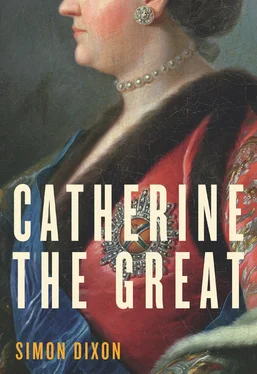By their swift action, the Orlovs had ruthlessly undercut any attempt on Panin’s part to have Catherine rule as regent for her son. Now it remained to secure her throne. Although sentries were posted across the city on 30 June to prevent drunken brawls, there was surprisingly little violence in St Petersburg, where quantities of alcohol released from the taverns made the atmosphere seem festive rather than vengeful among soldiers thankful not to be sent to invade Denmark. 71Instead they attacked the house of the unpopular Prince Georg Ludwig. For Johann Georg Eisen, a Lutheran pastor resident there thanks to the prince’s support for his Enlightened agricultural reforms, it was a deeply unnerving experience. ‘Those were such days,’ wrote Eisen after his return to Estland, ‘that the Last Judgment cannot appear any worse. I got back as if saved from a great fire.’ 72
‘They who plan a conspiracy’, Tooke remarked, ‘have always more zeal, more vigilance and activity, than he against whom it is directed.’ 73So it proved in the case of Peter III. For twenty-four hours he remained at Oranienbaum, unaware that he had been overthrown. Only when he found Peterhof deserted on the morning of 29 June did he begin to realise the scale of the disaster. Had the tsar been made of sterner stuff, he might have marched on the capital, as he was urged to do by Field Marshal Münnich, a veteran of Empress Anna’s war against the Turks in 1735–9 and the most distinguished of the exiles he had released from Siberia. But since Peter was no hero, this option was rapidly dismissed. Neither was he a coward, however, so he refused to flee to Mitau. Instead, he determined to sail to Kronstadt. Yet for once caution got the better of him, so that by the time he arrived the fortress had fallen to the rebels. When the tsar identified himself to a sentry at the blockaded entrance to the harbour, he was told that Peter III no longer existed. Having successfully repelled his ‘guest’, Admiral Talyzin wrote anxiously to Panin, asking for reinforcements. 74He need not have worried. Whatever resolve Peter may initially have possessed had gone. As his galley returned to Oranienbaum, he fainted into the arms of Elizabeth Vorontsova.
Catherine had meanwhile borrowed a Guards uniform, mounted her charger and ridden out with Dashkova to arrest her deposed husband. At the Trinity monastery, on the road to Peterhof, she met the vice chancellor, Prince Alexander Golitsyn, who presented a letter in which Peter offered to negotiate. The missive went without reply as Golitsyn swore allegiance to Catherine. Peter now offered to abdicate in return for safe passage to Holstein with his mistress. After this offer, too, had been refused, he was persuaded to sign an unconditional abdication. At first, he was taken with Vorontsova to Peterhof, where he was arrested after surrendering his sword, and transferred to his country estate, Ropsha. Here he was intended to remain in the custody of Aleksey Orlov, Fëdor Baryatynsky and Peter Passek, until the Schlüsselburg fortress was ready to receive him.
* * *
After his first restless night at Ropsha, Peter complained of headaches and wrote a pathetic letter to Catherine, asking her to remove the sentries from the neighbouring room since his own was so small and he was too fastidious to relieve himself in the presence of others. ‘[Your Majesty] knows that I always pace about in my room. This will make my legs swell up.’ That day, 30 June, his favourite bed was brought from Oranienbaum to make him more comfortable. Catherine, however, had no intention of granting his request to be taken to Holstein. As she later explained to Poniatowski, ‘he had everything he wanted, except for his freedom’. 75They made an odd couple, the giant, scar-faced Aleksey Orlov, and the shrivelled, sickly emperor. Only copious quantities of alcohol obscured the artificiality of their situation. This was fully revealed on 2 July, when Peter’s health took a turn for the worse. As Orlov reported to Catherine, ‘our ugly freak’ had fallen ‘seriously ill’ with ‘an unexpected colic’. ‘I fear that he might die tonight, but I fear even more that he might live through it. The first fear is caused by the fact that he talks nonsense all the time, which amuses us, and the second fear is that he is really a danger to us all and behaves as though nothing had happened.’ 76
The note of menace was unmistakeable. According to the Danish diplomat Andreas Schumacher, the end was swift. After refusing a poisoned cocktail made up by Dr Kruse, Peter was murdered on 3 July, so that he was dead by the time Dr Lüders reached Ropsha, and the only remaining job for a medic was the dissection performed by a second physician. 77The villains of the piece in this version of Peter’s demise are Grigory Teplov and Nikita Panin. Indeed, a prominent Russian historian has recently argued on the basis of Schumacher’s account that Panin ordered the deposed tsar’s murder as a last-ditch attempt to wrest the initiative from Catherine and the Orlovs and to ensure that she ruled as regent for her son. 78
Ingenious as this reconstruction of events may be, its central assumption remains incredible. Why should Panin, the urbane constitutionalist who had been anxious all along to ensure a bloodless transition of power, suddenly sanction Peter’s assassination? It is no more likely that Catherine herself gave explicit orders to kill him. She had proved herself audacious in a crisis, but there was nothing to be gained from making a martyr of her husband. Though a third letter from Aleksey Orlov to Catherine, dated 5 July, survives only in the form of a later copy, there seems no reason to disbelieve its claim that Peter was killed in a drunken scuffle:
Little Mother, most gracious lady, How can I explain or describe what happened. You will not believe your faithful servant but before God I speak the truth…. Little Mother, he is no more. But it never occurred to anyone, how could anyone think of raising a hand against our sovereign lord. But Sovereign lady, the deed is done. He started struggling with Prince Fëdor [Baryatynsky] at table. We had no time to separate them and he is no more. I don’t remember what we did but all of us are guilty and worthy of punishment. Have mercy upon me if only for my brother’s sake. I confess it all to you, and there is nothing to investigate. Forgive us, or order an end to be made quickly. Life is not worth living. We have angered you, and lost our souls forever. 79
Catherine accepted his word. She may not have sanctioned her husband’s death, but his survival would surely have imperilled hers. Now she was not only a usurper, but an assassin by association. Peter was given a paltry burial at the Alexander Nevsky monastery. Thirty-four years later, Tsar Paul would make Orlov, Baryatynsky and Passek pay dearly for their treachery. But for the moment, their star was in the ascendant, as Russia’s new ruler laid plans for her coronation and for the burst of reforming legislation that was to occupy the first five years of her reign.
CHAPTER SIX
‘Our Lady of St Petersburg’
1763–1766
Afew days before Catherine’s return to St Petersburg in the summer of 1763, the foreign ambassadors gathered for supper at the house of the Earl of Buckinghamshire. ‘We were all questioning one another, each man doubtful of his own information, yet everyone agreeing that we ought to be prepared for any event.’ Convinced from the start of the new regime’s inherent instability, they were sure they could scent its imminent collapse. The French attaché and the Austrian ambassador interpreted the desecration of the empress’s portrait on one of moscow’s triumphal arches as a symptom of the wider unrest generated by rumours that she was about to marry Grigory orlov. 1Catherine herself had unwittingly caused the scare by seeking official approval for a second marriage in case her sickly son died. one supporter of her coup, the Guards Captain Fëdor Khitrovo, was so appalled by the idea that he planned to kill Grigory and his brothers. Arrested at the end of may, Khitrovo caused alarm by claiming that he had been told by Aleksey orlov that Catherine had accepted the throne only under pressure from his brothers, having initially promised Panin that she would rule as regent for Grand Duke Paul. 2Though Khitrovo was quietly bundled away to his estates, in a vain attempt to avoid publicity, the security cordon erected in a six-mile radius around Tsarskoye Selo struck the diplomats as a sign of Catherine’s lasting nervousness. The Prussian ambassador Count Solms in turn thought her too frantic in her rush to reform. now that she had quarrelled with Princess Dashkova—‘the sort of woman to attempt a new revolution every week, purely for the pleasure of it’—Solms feared that her reign would last no longer than her husband’s. Buckinghamshire was inclined to agree: ‘i cannot help feeling for Her Imperial Majesty. Her present distress must be very great, and at the best, Her future prospect a most melancholy one.’ 3
Читать дальше












